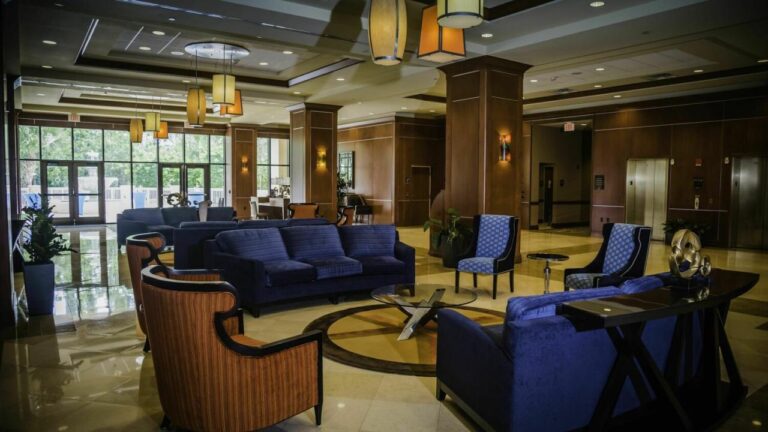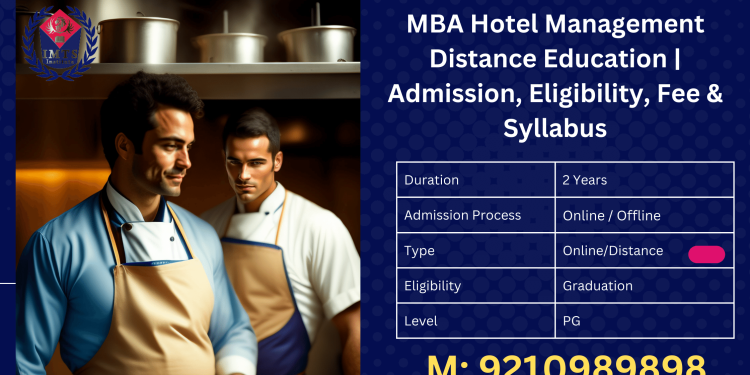Hospitality and Hotel MBA Distance Learning
Hospitality and Hotel MBA distance learning offers a flexible pathway to a rewarding career in the hospitality industry. This innovative approach combines the rigor of a traditional MBA with the convenience of online learning, allowing professionals to advance their careers while maintaining their current commitments. We’ll explore the curriculum, career prospects, and financial considerations of pursuing this degree, providing a comprehensive overview for prospective students.
This guide delves into the specifics of online Hospitality and Hotel MBA programs, examining various aspects from curriculum design and specialization options to career paths and financial aid opportunities. We will compare and contrast the distance learning experience with traditional on-campus programs, highlighting the advantages and disadvantages of each. The guide also explores the crucial role of accreditation and the importance of selecting a reputable institution.
Program Overview
A Distance Learning MBA in Hospitality and Hotel Management offers a flexible pathway to enhance professional skills and advance careers within the dynamic hospitality industry. This program caters to working professionals seeking to upskill or transition into management roles without disrupting their current employment. It provides a rigorous academic experience mirroring many aspects of a traditional MBA, but adapted for the online learning environment.
Curriculum of a Distance Learning MBA in Hospitality and Hotel Management
The curriculum typically covers a range of core business subjects, such as finance, marketing, and operations management, while integrating specialized hospitality and hotel management modules. These specialized modules often delve into areas like revenue management, hotel operations, food and beverage management, human resource management within the hospitality sector, and sustainable tourism practices. Electives may allow for further specialization in areas of particular interest, such as luxury hotel management or event planning.
The program often culminates in a capstone project or thesis, allowing students to apply their learning to a real-world hospitality challenge.
Admission Requirements for Distance Learning MBA Programs
Admission requirements vary between institutions, but generally include a bachelor’s degree from an accredited university, a minimum GPA (often 3.0 or higher), and professional experience in a related field. Many programs also require submission of GMAT or GRE scores, although some may waive this requirement based on work experience or other qualifications. A strong application essay outlining career goals and motivations is typically a key component of the application process.
Some programs may also require letters of recommendation from professional references.
Comparison of Distance Learning and On-Campus MBA Experiences
A distance learning MBA offers flexibility and convenience, allowing students to study at their own pace and location. This contrasts with the traditional on-campus experience, which necessitates regular attendance and interaction in a physical classroom setting. While distance learning may limit spontaneous collaboration and networking opportunities inherent in on-campus programs, many online programs actively foster community through online forums, virtual study groups, and scheduled online sessions.
The learning experience itself may also differ; on-campus programs often feature more hands-on activities, while distance learning might emphasize self-directed learning and online resources.
Career Paths After Completing a Distance Learning MBA in Hospitality and Hotel Management
Graduates of a distance learning MBA in hospitality and hotel management can access a wide array of career paths. Examples include roles such as Hotel General Manager, Revenue Manager, Food and Beverage Director, Director of Sales and Marketing, Event Planner, and various other management positions within hotels, resorts, cruise lines, and other hospitality businesses. The advanced business acumen gained through the MBA can also open doors to consulting roles within the industry or even entrepreneurial ventures in the hospitality sector.
For instance, an individual with a strong background in finance and hospitality might successfully launch their own boutique hotel or restaurant.
Advantages and Disadvantages of a Distance Learning MBA in Hospitality and Hotel Management, Hospitality and hotel MBA distance learning
Choosing a distance learning MBA involves weighing several factors.
- Advantages: Flexibility and convenience, affordability (often lower tuition fees than on-campus programs), accessibility to a wider range of programs, ability to continue working while studying.
- Disadvantages: Requires strong self-discipline and time management skills, less opportunity for spontaneous networking and collaboration, potential for isolation, may require more self-directed learning.
Course Content and Specializations

Our distance learning MBA in Hospitality and Hotel Management offers a comprehensive curriculum designed to equip graduates with the skills and knowledge necessary to excel in this dynamic industry. The program is structured around three core specializations, allowing students to tailor their studies to their specific career aspirations. Each specialization provides a deep dive into specific areas of expertise, complemented by a robust foundation in core business principles.This section details the three core specializations, the skills developed within each, and provides a comparative analysis of curricula from three leading universities offering similar distance learning MBA programs.
The relevance of specific courses to current industry trends will also be highlighted.
Hospitality and Hotel Management Specializations
Three key specializations within our program are Revenue Management, Sustainable Hospitality Operations, and Digital Marketing & E-commerce in Hospitality. These areas represent critical growth sectors within the hospitality industry, demanding specialized expertise.
Revenue Management Specialization
This specialization focuses on developing advanced skills in pricing strategies, yield management, forecasting, and revenue optimization. Students learn to analyze market trends, understand consumer behavior, and leverage data analytics to maximize revenue generation. Skills developed include data analysis using specialized software, forecasting techniques, and strategic pricing methodologies. Graduates are equipped to manage revenue streams effectively, contributing significantly to the profitability of hotels and hospitality businesses.
Sustainable Hospitality Operations Specialization
This specialization addresses the growing importance of sustainability within the hospitality industry. Students learn about environmental management systems, energy efficiency, waste reduction, and responsible sourcing. Skills developed include implementing sustainable practices, managing environmental impact, and communicating sustainability initiatives to stakeholders. This specialization prepares graduates to lead environmentally responsible operations, a crucial aspect of modern hospitality management. The focus on corporate social responsibility is increasingly important to investors and customers.
Digital Marketing & E-commerce in Hospitality Specialization
This specialization equips students with the skills to effectively leverage digital platforms for marketing and sales within the hospitality sector. Students will learn about search engine optimization (), social media marketing, online reputation management, and e-commerce strategies. Skills developed include digital marketing campaign management, content creation, data analytics for digital marketing, and customer relationship management (CRM) using digital tools.
Graduates will be proficient in attracting and engaging customers online, a crucial skillset in today’s digital age.
Comparative Curriculum Analysis
The following table compares the curricula of three hypothetical universities offering distance learning MBAs in Hospitality and Hotel Management. Note that these are examples and actual university curricula may vary.
| Course Name | Description | Credit Hours | Learning Objectives |
|---|---|---|---|
| Strategic Hospitality Management | Develops strategic planning and decision-making skills within the hospitality industry. | 3 | Students will be able to formulate and implement strategic plans for hospitality organizations. |
| Financial Accounting for Hospitality | Covers the principles of financial accounting specifically applied to the hospitality industry. | 3 | Students will be able to prepare and interpret financial statements for hospitality businesses. |
| Revenue Management | Explores pricing strategies, yield management, and revenue optimization techniques. | 3 | Students will be able to implement revenue management strategies to maximize profitability. |
| Sustainable Tourism and Hospitality | Examines the principles of sustainable tourism and their application in hospitality operations. | 3 | Students will be able to develop and implement sustainable practices within hospitality organizations. |
| Digital Marketing in Hospitality | Covers the use of digital marketing strategies to promote and sell hospitality products and services. | 3 | Students will be able to develop and implement effective digital marketing campaigns for hospitality businesses. |
Course Relevance to Current Industry Trends
The courses included in this MBA program directly address several key trends shaping the hospitality industry. For example, the increasing importance of data analytics in revenue management is reflected in the dedicated revenue management courses. Similarly, the growing focus on sustainability is addressed through dedicated courses on sustainable tourism and operations. The emphasis on digital marketing reflects the industry’s shift towards online platforms for customer acquisition and engagement.
The curriculum’s adaptability ensures graduates are prepared for the evolving landscape of the hospitality sector.
Faculty and Resources
Our distance learning MBA program in Hospitality and Hotel Management boasts a distinguished faculty comprised of experienced professionals and renowned academics. Their expertise ensures a high-quality learning experience, bridging the gap between theoretical knowledge and practical application within the dynamic hospitality industry. Access to a robust online learning platform and comprehensive support services further enhances the learning journey.Our faculty members typically hold doctoral or master’s degrees in relevant fields such as hospitality management, business administration, tourism, or related disciplines.
Many possess extensive industry experience, having held senior management positions in hotels, restaurants, resorts, or other hospitality organizations. This blend of academic rigor and practical experience ensures that our curriculum remains current and relevant to industry trends. For instance, a typical faculty member might be a former general manager of a large hotel chain, now leveraging their expertise to educate the next generation of hospitality leaders, or a professor with years of research experience in revenue management strategies.
Online Learning Platform and Features
The program utilizes a state-of-the-art learning management system (LMS) designed specifically for online education. This platform offers a range of features to facilitate effective learning and interaction. These include interactive modules, video lectures, downloadable course materials, discussion forums, assignment submission tools, and a comprehensive library of resources. The LMS is accessible 24/7 from any device with an internet connection, allowing students to learn at their own pace and convenience.
The intuitive interface ensures ease of navigation, while robust technical support is available to address any technical issues promptly.
Support Services for Distance Learning Students
We understand that pursuing an MBA while managing other commitments requires significant dedication. To support our distance learning students, we offer a range of services designed to enhance their learning experience and career prospects. These include dedicated technical support to address any platform or technological challenges, readily available academic advising to help students navigate the program and plan their course selections, and comprehensive career services to assist with resume building, job searching, and networking opportunities.
Our career services team works closely with industry partners to provide internships and job placement assistance, ensuring our graduates are well-prepared for successful careers in the hospitality sector.
Hypothetical Online Learning Module: Revenue Management in Hospitality
This module explores the crucial concept of revenue management in the hospitality industry. The module begins with an introduction to the core principles of revenue management, defining key terms such as pricing strategies, demand forecasting, and occupancy optimization. Students then engage in interactive exercises that simulate real-world scenarios, such as adjusting room rates based on predicted occupancy levels and analyzing the impact of various promotional offers on revenue generation.
Video lectures feature interviews with experienced revenue managers from leading hotel chains, providing valuable insights into industry best practices. A case study analysis challenges students to apply learned concepts to a real-world hotel situation, requiring them to develop a comprehensive revenue management strategy. Finally, a final assessment tests students’ understanding of the concepts covered, ensuring they can effectively apply revenue management principles to maximize profitability in the hospitality industry.
The module emphasizes the importance of data analysis and strategic decision-making in optimizing revenue generation. Students will learn to utilize various analytical tools and techniques to make informed decisions about pricing, inventory management, and promotional activities.
Career Prospects and Industry Trends
This distance learning MBA program in Hospitality and Hotel Management equips graduates with the skills and knowledge to thrive in a dynamic and ever-evolving industry. Graduates are well-positioned for a variety of roles, leveraging both their business acumen and specialized hospitality expertise. The program’s focus on current industry trends ensures that our graduates are prepared for the challenges and opportunities of the future.The hospitality and hotel industry is characterized by its constant evolution, driven by technological advancements, shifting consumer preferences, and global economic fluctuations.
Understanding these trends is crucial for success in this field. Our program directly addresses these dynamics, preparing graduates to navigate this complex landscape effectively.
Typical Job Roles for Graduates
Our graduates typically secure positions across various sectors within the hospitality industry. The specific role depends on individual career goals and prior experience. However, common career paths include roles offering significant responsibility and growth potential.
- Hotel Management: General Managers, Revenue Managers, Food and Beverage Directors, Sales and Marketing Managers, and Operations Managers are frequently sought-after roles for our graduates.
- Hospitality Consulting: Many graduates pursue careers advising hotels and other hospitality businesses on strategic planning, operations optimization, and revenue management.
- Corporate Roles within Hospitality Chains: Large hotel chains often recruit graduates for roles in corporate strategy, finance, human resources, and marketing.
- Entrepreneurship: The entrepreneurial spirit is fostered in our program, and many graduates successfully launch their own hospitality ventures, such as boutique hotels, restaurants, or event planning businesses.
Current Trends and Future Outlook
The hospitality industry is experiencing significant transformation. Technological advancements, such as online booking platforms, revenue management systems, and customer relationship management (CRM) software, are reshaping operations. The rise of the sharing economy, with platforms like Airbnb, presents both challenges and opportunities. Sustainability and eco-conscious practices are becoming increasingly important, influencing both consumer choices and operational strategies. Finally, the industry is adapting to a post-pandemic world, focusing on enhanced hygiene protocols and flexible booking policies.
The future outlook is positive, with a growing demand for skilled professionals capable of navigating these changes. For example, the increasing popularity of sustainable tourism has created a high demand for professionals who understand and can implement eco-friendly practices in hotels and resorts.
Salary Expectations Compared to Traditional MBAs
While salary expectations vary depending on experience, location, and specific role, graduates of our specialized hospitality MBA program often command competitive salaries. Although direct comparison to traditional MBA graduates is difficult due to varying industry specializations, graduates often earn salaries comparable to or exceeding those in other MBA fields, especially considering the high demand for skilled hospitality professionals.
Factors such as specific job roles, company size, and geographic location significantly influence salary ranges. For instance, a General Manager at a luxury hotel in a major city would likely earn a significantly higher salary than a similar role at a smaller property in a rural area. However, the specialized skills gained in our program provide a strong foundation for negotiating competitive compensation packages.
Skill Translation to Real-World Applications
The skills learned in our program translate directly into practical applications within the hospitality industry. For example:
- Financial Management: Budgeting, forecasting, and financial analysis skills are crucial for managing hotel operations profitably.
- Strategic Management: Developing and implementing strategic plans to enhance competitiveness and achieve business goals is essential.
- Marketing and Sales: Understanding consumer behavior, developing effective marketing strategies, and managing sales operations are vital for maximizing revenue.
- Operations Management: Efficiently managing resources, optimizing processes, and ensuring guest satisfaction are critical for operational success.
- Human Resource Management: Effective recruitment, training, and employee motivation are key to building a high-performing team.
Cost and Financial Aid
Pursuing an MBA in hospitality through distance learning presents a valuable investment in your future career. Understanding the associated costs and available financial aid options is crucial for making an informed decision. This section details the typical expenses, funding possibilities, and a comparison with traditional on-campus programs.
Tuition fees for a distance learning hospitality MBA vary significantly depending on the institution, program length, and the specific curriculum. Generally, expect to pay between $10,000 and $70,000 for the entire program. This range reflects the differences in prestige, program features (like international study trips, specialized software access, or industry certifications), and the university’s overall pricing structure. Beyond tuition, consider additional costs such as textbooks, course materials (online access fees, software subscriptions), technology requirements (laptop, reliable internet access), and potential professional development fees (e.g., conferences, workshops).
Financial Aid Options
Numerous financial aid options are available to help offset the costs of a distance learning MBA. These options can significantly reduce the financial burden and make pursuing this advanced degree more accessible.
Many institutions offer various scholarships specifically for online MBA students. These scholarships often consider academic merit, professional experience, and demonstrated financial need. Additionally, external scholarships and grants from organizations within the hospitality industry or general educational funding bodies are frequently available. Students should thoroughly research and apply to as many relevant scholarships as possible. Federal student loans, both subsidized and unsubsidized, are also accessible to eligible students, offering flexible repayment options.
Finally, some employers offer tuition reimbursement programs that can cover a portion or all of the tuition costs. It is essential to investigate all possibilities and plan your funding strategy carefully.
Cost Comparison: Distance Learning vs. On-Campus
A distance learning MBA typically costs less than a traditional on-campus program. This cost reduction stems from several factors. Firstly, distance learning eliminates expenses associated with on-campus living, such as accommodation, meals, and commuting. Secondly, the overhead costs for online programs are often lower for universities as they don’t need to maintain extensive physical infrastructure to support on-campus learning.
However, this cost advantage can vary based on the specific programs offered by different universities. For example, a prestigious university’s online program might have a higher cost than a less-known university’s on-campus program. Always compare the total cost of attendance, including all fees and expenses, when making your decision.
Potential Scholarship Opportunities
Securing scholarship funding can significantly reduce the financial burden of pursuing your MBA. The following table provides examples of potential scholarship opportunities and their typical requirements. Note that eligibility criteria and award amounts vary based on the institution and specific scholarship.
| Scholarship Name | Provider | Requirements | Typical Award Amount |
|---|---|---|---|
| Example University Merit Scholarship | Example University | High GPA, strong GMAT/GRE score | $5,000 – $10,000 |
| Hospitality Industry Association Scholarship | Hospitality Industry Association | Membership, demonstrated commitment to the industry | $2,000 – $5,000 |
| National Association of Graduate Professionals Scholarship | National Association of Graduate Professionals | Membership, strong academic record and career goals | $1,000 – $3,000 |
| Example Foundation Grant | Example Foundation | Financial need, strong academic standing, essay submission | Varies |
Accreditation and Program Quality

Choosing a distance learning MBA program, especially in a specialized field like hospitality and hotel management, requires careful consideration of program quality. Accreditation plays a crucial role in assuring prospective students that the program meets established educational standards and prepares graduates for successful careers. Accredited programs undergo rigorous evaluations, ensuring curriculum relevance, faculty qualifications, and overall program effectiveness.Accreditation signifies a commitment to quality and provides several benefits to students.
It increases the likelihood of employer recognition, enhances career prospects, and often facilitates transfer of credits to other institutions. Moreover, accredited programs generally adhere to higher standards of teaching, learning, and assessment, leading to a more robust and valuable educational experience.
Relevant Accreditation Bodies for Hospitality Management Programs
Several organizations grant accreditation to business and hospitality management programs, each with its own specific criteria and focus. The choice of accreditation body can significantly impact the perceived value and recognition of the degree. It is important to understand the differences between these bodies to make an informed decision.
Examples of Reputable Universities Offering Accredited Distance Learning MBAs in Hospitality and Hotel Management
Many reputable universities worldwide offer accredited distance learning MBA programs with specializations in hospitality and hotel management. These programs typically leverage online learning technologies to deliver a high-quality educational experience comparable to on-campus programs. The specific universities and their accreditation status may vary depending on location and program offerings. For example, some institutions might hold accreditation from AACSB International (Association to Advance Collegiate Schools of Business) which is a highly recognized global accreditation body for business schools, while others might hold regional accreditation specific to their country or region.
The availability of specific programs and their accreditation details should be verified directly with the university. Prospective students are advised to research and confirm accreditation details before enrolling in any program.
Last Recap

Embarking on a Hospitality and Hotel MBA distance learning journey presents a unique opportunity to acquire valuable skills and knowledge within a dynamic and ever-evolving industry. By carefully considering the program’s curriculum, career prospects, and financial implications, aspiring hospitality professionals can make informed decisions that align with their personal and professional goals. The flexibility and accessibility of distance learning open doors to a wide range of career advancements, making it a compelling option for those seeking to enhance their expertise in this exciting field.
Remember to research accredited programs and explore available financial aid options to ensure a successful and rewarding learning experience.
Top FAQs: Hospitality And Hotel MBA Distance Learning
What are the technology requirements for online MBA programs?
Most programs require a reliable computer with high-speed internet access, updated software, and a webcam for participation in online classes and discussions.
How long does it typically take to complete a distance learning MBA in hospitality and hotel management?
The duration varies depending on the program and the student’s pace, but most programs can be completed within 18-24 months.
Are there networking opportunities for distance learning students?
Many programs offer online forums, virtual networking events, and opportunities to connect with fellow students and alumni, fostering a sense of community.
Can I transfer credits from previous education to a distance learning MBA program?
Credit transfer policies vary by institution. It’s essential to check with the specific program’s admissions office to determine transferability.
What kind of support is available for international students in distance learning MBA programs?
Support services often include dedicated international student advisors, assistance with visa applications, and resources for navigating cultural differences.





